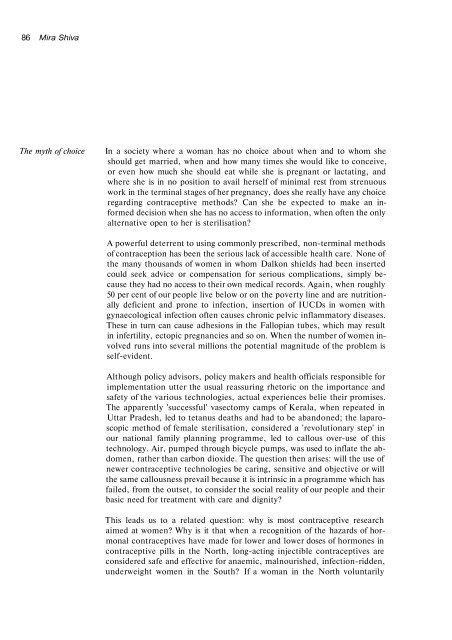Environmental Degradation and Subversion of Health - Dag ...
Environmental Degradation and Subversion of Health - Dag ...
Environmental Degradation and Subversion of Health - Dag ...
You also want an ePaper? Increase the reach of your titles
YUMPU automatically turns print PDFs into web optimized ePapers that Google loves.
86 Mira Shiva<br />
The myth <strong>of</strong> choice In a society where a woman has no choice about when <strong>and</strong> to whom she<br />
should get married, when <strong>and</strong> how many times she would like to conceive,<br />
or even how much she should eat while she is pregnant or lactating, <strong>and</strong><br />
where she is in no position to avail herself <strong>of</strong> minimal rest from strenuous<br />
work in the terminal stages <strong>of</strong> her pregnancy, does she really have any choice<br />
regarding contraceptive methods? Can she be expected to make an informed<br />
decision when she has no access to information, when <strong>of</strong>ten the only<br />
alternative open to her is sterilisation?<br />
A powerful deterrent to using commonly prescribed, non-terminal methods<br />
<strong>of</strong> contraception has been the serious lack <strong>of</strong> accessible health care. None <strong>of</strong><br />
the many thous<strong>and</strong>s <strong>of</strong> women in whom Dalkon shields had been inserted<br />
could seek advice or compensation for serious complications, simply because<br />
they had no access to their own medical records. Again, when roughly<br />
50 per cent <strong>of</strong> our people live below or on the poverty line <strong>and</strong> are nutritionally<br />
deficient <strong>and</strong> prone to infection, insertion <strong>of</strong> IUCDs in women with<br />
gynaecological infection <strong>of</strong>ten causes chronic pelvic inflammatory diseases.<br />
These in turn can cause adhesions in the Fallopian tubes, which may result<br />
in infertility, ectopic pregnancies <strong>and</strong> so on. When the number <strong>of</strong> women involved<br />
runs into several millions the potential magnitude <strong>of</strong> the problem is<br />
self-evident.<br />
Although policy advisors, policy makers <strong>and</strong> health <strong>of</strong>ficials responsible for<br />
implementation utter the usual reassuring rhetoric on the importance <strong>and</strong><br />
safety <strong>of</strong> the various technologies, actual experiences belie their promises.<br />
The apparently 'successful' vasectomy camps <strong>of</strong> Kerala, when repeated in<br />
Uttar Pradesh, led to tetanus deaths <strong>and</strong> had to be ab<strong>and</strong>oned; the laparoscopic<br />
method <strong>of</strong> female sterilisation, considered a 'revolutionary step' in<br />
our national family planning programme, led to callous over-use <strong>of</strong> this<br />
technology. Air, pumped through bicycle pumps, was used to inflate the abdomen,<br />
rather than carbon dioxide. The question then arises: will the use <strong>of</strong><br />
newer contraceptive technologies be caring, sensitive <strong>and</strong> objective or will<br />
the same callousness prevail because it is intrinsic in a programme which has<br />
failed, from the outset, to consider the social reality <strong>of</strong> our people <strong>and</strong> their<br />
basic need for treatment with care <strong>and</strong> dignity?<br />
This leads us to a related question: why is most contraceptive research<br />
aimed at women? Why is it that when a recognition <strong>of</strong> the hazards <strong>of</strong> hormonal<br />
contraceptives have made for lower <strong>and</strong> lower doses <strong>of</strong> hormones in<br />
contraceptive pills in the North, long-acting injectible contraceptives are<br />
considered safe <strong>and</strong> effective for anaemic, malnourished, infection-ridden,<br />
underweight women in the South? If a woman in the North voluntarily
















